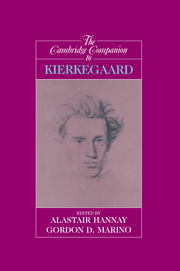Book contents
- Frontmatter
- Introduction
- 1 Out with It!
- 2 The unknown Kierkegaard
- 3 Art in an age of reflection
- 4 Kierkegaard and Hegel
- 5 Neither either nor or
- 6 Realism and antirealism in Kierkegaard's Concluding Unscientific Postscript
- 7 Existence, emotion, and virtue
- 8 Faith and the Kierkegaardian leap
- 9 Arminian edification
- 10 “Developing” Fear and Trembling
- 11 Repetition
- 12 Anxiety in The Concept of Anxiety
- 13 Kierkegaard and the variety of despair
- 14 Kierkegaard's Christian ethics
- 15 Religious dialectics and Christology
- 16 The utilitarian self and the "useless" passion of faith
- Bibliography
- Index
15 - Religious dialectics and Christology
Published online by Cambridge University Press: 28 May 2006
- Frontmatter
- Introduction
- 1 Out with It!
- 2 The unknown Kierkegaard
- 3 Art in an age of reflection
- 4 Kierkegaard and Hegel
- 5 Neither either nor or
- 6 Realism and antirealism in Kierkegaard's Concluding Unscientific Postscript
- 7 Existence, emotion, and virtue
- 8 Faith and the Kierkegaardian leap
- 9 Arminian edification
- 10 “Developing” Fear and Trembling
- 11 Repetition
- 12 Anxiety in The Concept of Anxiety
- 13 Kierkegaard and the variety of despair
- 14 Kierkegaard's Christian ethics
- 15 Religious dialectics and Christology
- 16 The utilitarian self and the "useless" passion of faith
- Bibliography
- Index
Summary
It is frequently said that if Christ came to the world now he would once again be crucified. This is not entirely true. The world has changed; it is now immersed in “understanding.” Therefore Christ would be ridiculed, treated as a mad man, but a mad man at whom one laughs. . . . I now understand better and better the original and profound relationship I have with the comic, and this will be useful to me in illuminating Christianity.
-Journals and Papers (Pap. X A 187)HISTORICAL SITUATION
At the beginning of the nineteenth century, lived religiousness and piety were no longer a matter of course in the intellectual circles of Europe. Schleiermacher's early work, On Religion: Speeches to Its Cultured Despisers, signals this shift, as does the religion that is at once criticized and philosophically defended in Hegel's concept of Absolute Spirit. The opposition of rational enlightenment to nonconceptual (religious) revelation such as Kant and Lessing had carried out with exemplary success at the end of the eighteenth century lay like a long shadow over every effort of the subsequent period to present faith in God and religion - or even the core of Christianity, reconciliation - at all argumentatively.
- Type
- Chapter
- Information
- The Cambridge Companion to Kierkegaard , pp. 376 - 396Publisher: Cambridge University PressPrint publication year: 1997
- 1
- Cited by

